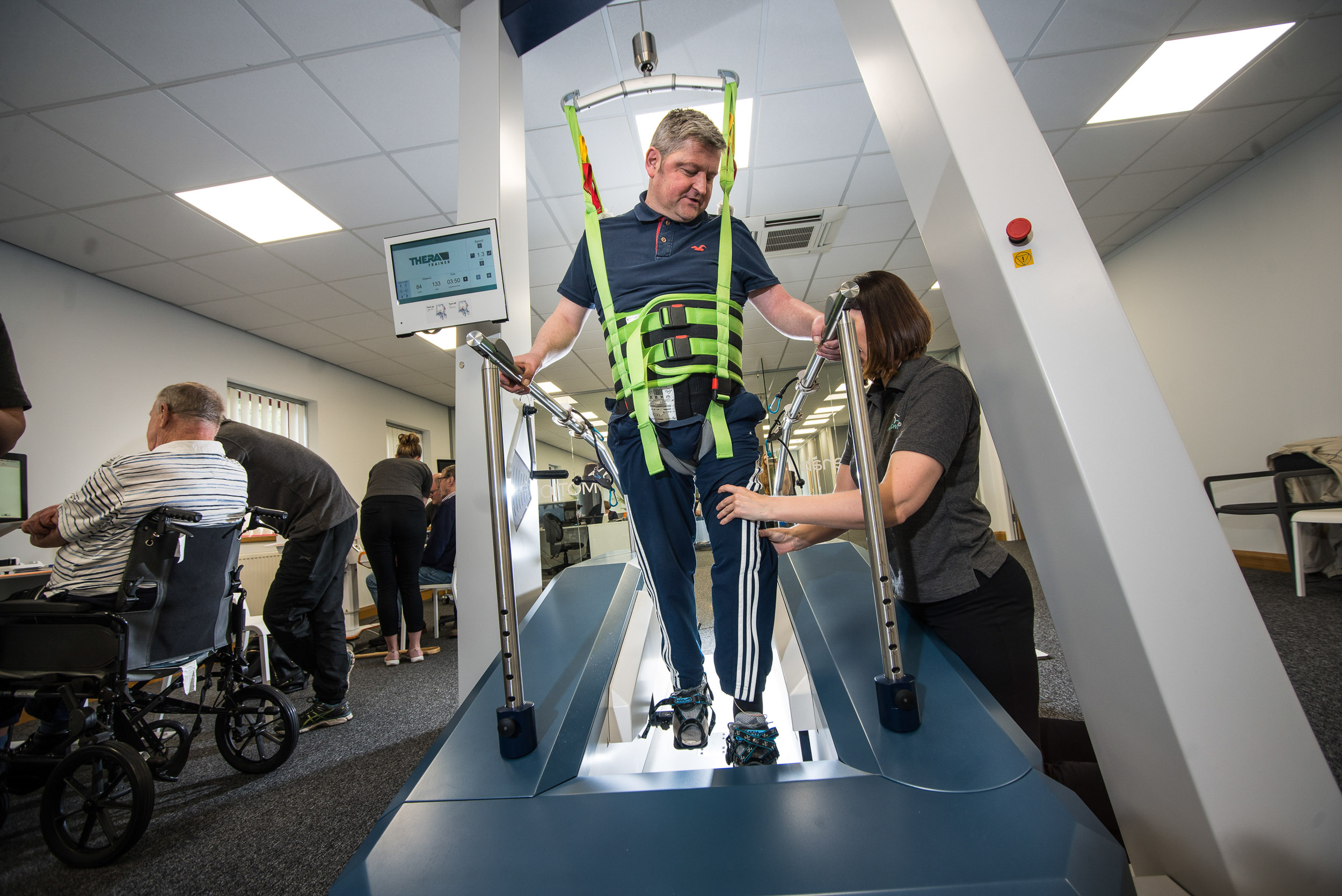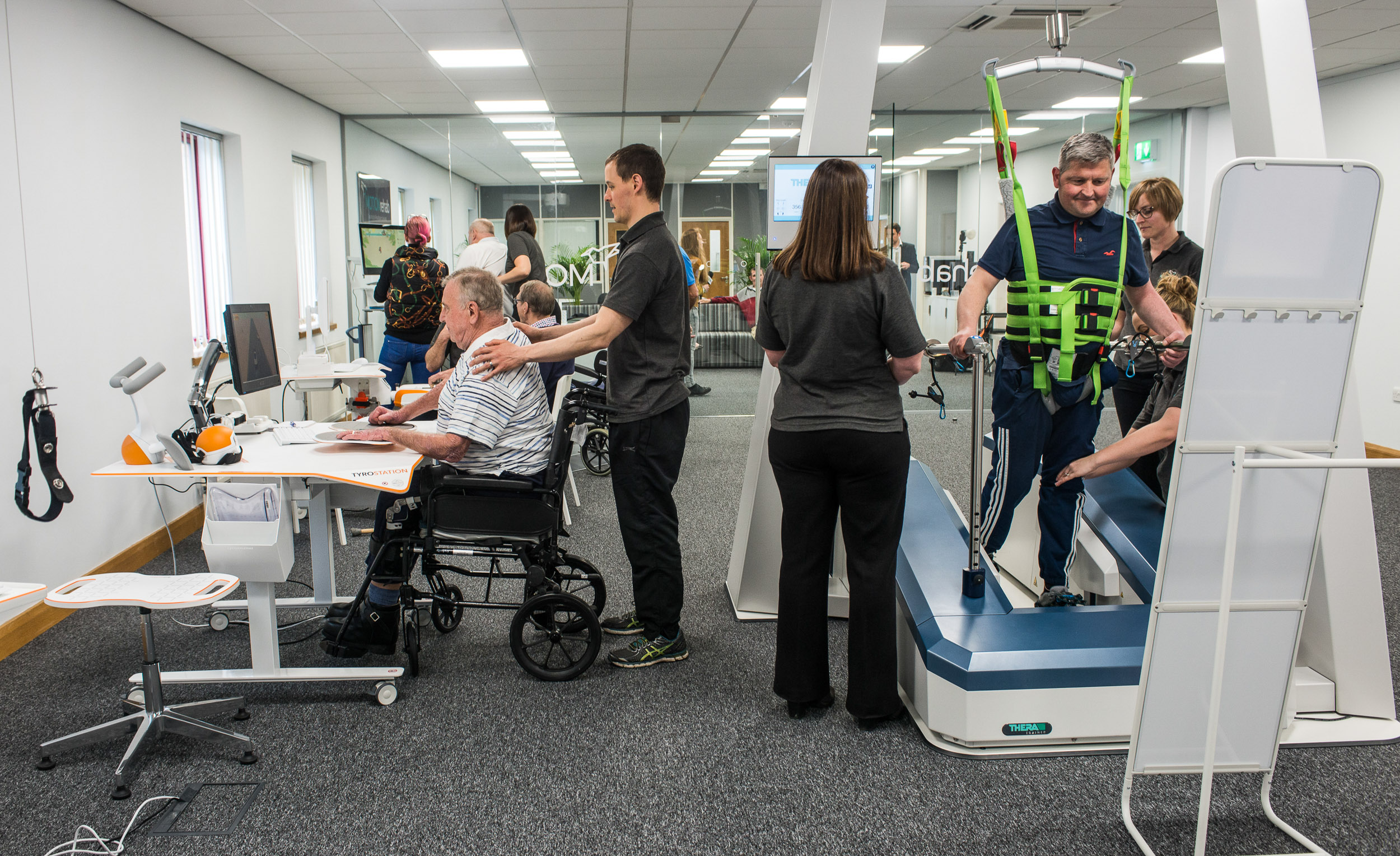
THERAPY Magazin
Intensive robot-assisted neurological rehabilitation
How robot-assisted therapy devices are redefining outpatient neurological aftercare – explained in practical terms in the THERA-Trainer webinar with Sarah Daniel. Learn more now and be inspired.

Sarah Daniel
CEO MOTIONrehab
How modern robotics-supported technologies support people with neurological impairments in outpatient aftercare
In September 2024, experts from around the world immersed themselves in an inspiring online session on the future of neurological rehabilitation. The THERA-Trainer webinar with Sarah Daniel, MSc, founder and therapeutic director of MOTIONrehab®, presented a fascinating and practical introduction to the use of cutting-edge robotics-supported technologies in neurorehabilitation.
The future of neurorehabilitation
With over a decade of experience in outpatient neurological intensive therapy, Sarah Daniel provided a very interesting insight into the innovative approaches of MOTIONrehab®. Her presentation centred on one key question: How can technological advances overcome the boundaries of traditional rehabilitation? Answer: Through the targeted use of robotics-supported and sensor-based therapy devices, patients can receive personalised, intensive and effective motor therapies that are often not feasible in traditional outpatient settings.
One key focus was the scientific evidence demonstrating the positive effect of intensive, repetitive movement patterns in neurorehabilitation. In her presentation, she impressively demonstrated how innovative technologies accelerate motor learning, promote brain plasticity and ultimately optimise the functional progress of patients. She repeatedly referred to the recommendations of international guidelines.
With over a decade of experience in outpatient neurological intensive therapy, Sarah Daniel provided a very interesting insight into the innovative approaches of MOTIONrehab®. Her presentation centred on one key question: How can technological advances overcome the boundaries of traditional rehabilitation? Answer: Through the targeted use of robotics-supported and sensor-based therapy devices, patients can receive personalised, intensive and effective motor therapies that are often not feasible in traditional outpatient settings.
One key focus was the scientific evidence demonstrating the positive effect of intensive, repetitive movement patterns in neurorehabilitation. In her presentation, she impressively demonstrated how innovative technologies accelerate motor learning, promote brain plasticity and ultimately optimise the functional progress of patients. She repeatedly referred to the recommendations of international guidelines.

From theory to practice: success models and challenges
he discussion about how modern rehabilitation technologies can be successfully integrated into existing treatment concepts was particularly exciting. Using real case studies, Daniel demonstrated how MOTIONrehab® tailors the therapeutic approach to the needs of patients.
Yet with technological innovation come economic challenges too. A key theme of the webinar was therefore the question of how a cost-efficient implementation of robotics-supported rehabilitation might look in healthcare systems with limited resources. The participants received valuable insights on how to reconcile quality and cost-effectiveness without compromising patient care.
he discussion about how modern rehabilitation technologies can be successfully integrated into existing treatment concepts was particularly exciting. Using real case studies, Daniel demonstrated how MOTIONrehab® tailors the therapeutic approach to the needs of patients.
Yet with technological innovation come economic challenges too. A key theme of the webinar was therefore the question of how a cost-efficient implementation of robotics-supported rehabilitation might look in healthcare systems with limited resources. The participants received valuable insights on how to reconcile quality and cost-effectiveness without compromising patient care.
Interactive Q&A – a glimpse into the work of experts
The concluding Q&A session featured insightful and practical questions from the participants. The lively discussion highlighted the significant interest in these innovative methods, ranging from the use of robotics-supported systems in diverse clinical and non-clinical settings to tangible therapeutic successes.
The concluding Q&A session featured insightful and practical questions from the participants. The lively discussion highlighted the significant interest in these innovative methods, ranging from the use of robotics-supported systems in diverse clinical and non-clinical settings to tangible therapeutic successes.
Conclusion: a milestone for neurological rehabilitation
The THERA-Trainer webinar has once again amply demonstrated what the future of neurorehabilitation could look like. Tailored, technology-supported therapeutic approaches are unlocking entirely new possibilities for patients with neurological impairments.
A recording of the webinar is available if you missed it or if you would like to explore the topic further.
The THERA-Trainer webinar has once again amply demonstrated what the future of neurorehabilitation could look like. Tailored, technology-supported therapeutic approaches are unlocking entirely new possibilities for patients with neurological impairments.
A recording of the webinar is available if you missed it or if you would like to explore the topic further.
2025-1
Audience
Gait
Inpatient Rehabilitation
Knowledge
lyra
Outpatient Rehabilitation
Products
Section
Therapy & Practice
THERAPY Magazine
Volume-Issue

Sarah Daniel
CEO MOTIONrehab
Sarah Daniel is the owner and managing director of MOTIONrehab. In 2001, she completed her training at St. George’s Medical School in London with a 1st Class Honours Degree. She earned her Master's in Neurological Physiotherapy from Coventry University with a Merit. In April 2018, Sarah Daniel opened the UK's first intensive outpatient neurological rehabilitation facility in Leeds, where she also utilizes robotics and VR technology.
References:
- https://thera-trainer.com/en/education/intensive-robotic-neurological-rehabilitation/
Related contents
Find related exciting contents in our media library.
Mehr laden
This is not what you are searching for? Knowledge
Meet our specialists.
Are you interested in our solutions? Schedule a meeting with a Consultant to talk through your strategy and understand how TEHRA-Trainer can help you to advance rehabilitation.
You need to load content from reCAPTCHA to submit the form. Please note that doing so will share data with third-party providers.
More InformationYou are currently viewing a placeholder content from Turnstile. To access the actual content, click the button below. Please note that doing so will share data with third-party providers.
More Information